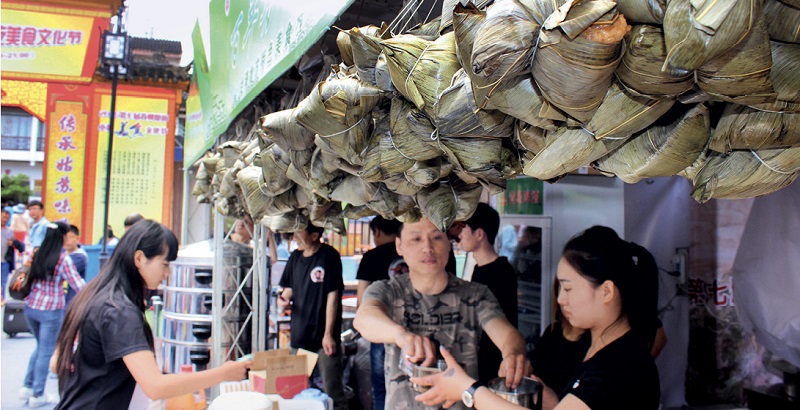Suzhou's Dragon Boat Festival

Customers are buying Suzhou zongzi during the Dragon Boat Festival.
 On the fifth day of the fifth month on the lunar calendar, most parts of China commemorate Qu Yuan (340-278 BC), the great Chinese poet who lived in the State of Chu during the Warring States period, by celebrating the Dragon Boat Festival. In Suzhou, a prosperous city in east China, local people’s folk customs during the festival differ from other regions. Here, the origin of the festival can be traced back to the commemoration of Wu Zixu (559-484 BC), a prestigious general of the State of Wu during the Spring and Autumn Period. Over time, the Dragon Boat Festival has gradually evolved into a grand event that is celebrated in Suzhou every year, featuring distinctive local cultural traditions and folk activities that attract large turnouts of people. The custom was included in the first batch of China’s national intangible cultural heritage items in 2006.
On the fifth day of the fifth month on the lunar calendar, most parts of China commemorate Qu Yuan (340-278 BC), the great Chinese poet who lived in the State of Chu during the Warring States period, by celebrating the Dragon Boat Festival. In Suzhou, a prosperous city in east China, local people’s folk customs during the festival differ from other regions. Here, the origin of the festival can be traced back to the commemoration of Wu Zixu (559-484 BC), a prestigious general of the State of Wu during the Spring and Autumn Period. Over time, the Dragon Boat Festival has gradually evolved into a grand event that is celebrated in Suzhou every year, featuring distinctive local cultural traditions and folk activities that attract large turnouts of people. The custom was included in the first batch of China’s national intangible cultural heritage items in 2006. Festive activities of Suzhou’s Dragon Boat Festival involve almost all aspects of people’s daily life. In addition to the common events like dragon boat racing and making zongzi (a triangular-shaped dumpling made of glutinous rice wrapped in bamboo or reed leaves) and other festive food, there are also other customs that reflect local people’s life wisdom in adapting to nature, such as hanging mugwort and calamus, brewing realgar wine, and sewing sachets. Suzhou’s silk and clothing culture that includes wearing five-venom clothes, tiger-head shoes, and five-color silk bracelets also play a key role in the celebration events.
In Suzhou, the fifth lunar month is called the month of venom. During this period, the weather there is humid and hot, and insects begin flying around, causing people to take precautions to drive away the “five venoms”: snakes, centipedes, scorpions, lizards, and toads. Suzhou people usually hang calamus on doors during the Dragon Boat Festival. Since calamus leaves are shaped like a sword, it is said that the leaves can “cut a thousand evils” and repel the “five venoms.” In addition to this, the herbal fragrance of calamus can repel mosquitoes and purify the air.
Suzhou residents also tie mugwort into bunches and hang garlic on the bottom, and then hang them on doors. Sachets are a necessity during the Dragon Boat Festival in Suzhou. Those silk incense bags are usually embroidered with patterns of flowers and animals and stuffed with realgar and other herbs, which are believed to keep away the plague and various evil venom.
In the past, children in every household in Suzhou would dress up in an apricot-colored silk top called “five-venom coat”, which were usually handmade by the elderly family members. The images of five venomous creatures were lovingly sewed on the fabric. Then, on the day of the Dragon Boat Festival, children in a neighborhood all wore the same type of top. People believed that the uniquely decorated tops could keep them healthy and safe from disasters and diseases.
The traditional customs of the Dragon Boat Festival in Suzhou demonstrate people’s wishes for peace, stability, and health. These traditional activities present ancient people’s wisdom of how to live in harmony with nature. Most of these customs are still practiced in Suzhou today. Every year, Suzhou organizes Dragon Boat Festival-related theme activities. Today, people livestream video footage of the cultural experiences of “making zongzi” and “sewing scented bags” during the festival, exhibiting the lively Dragon Boat Festival customs in Jiangsu to the rest of the world.